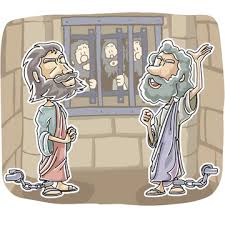John 9:1 – As he passed by, he saw a man blind from birth.
At the close of chapter 8, we found Jesus leaving the temple after a serious confrontation with the Jewish leaders. He was essentially escaping from the Jews who were ready to stone him for blasphemy.
The question is, how much time elapsed between the last verse in chapter 8 (Jesus left the temple) and the statement here in chapter 9 (as he passed by)?
Some people believe that Jesus encountered the blind man immediately after leaving the temple. While this is possible, it would hardly create a 'cooling off' period where the Jewish religious leaders had a chance to calm down (remember, they wanted to stone Jesus). It is much more likely that Jesus left the temple and went directly to the Mount of Olives, where he stayed the night. This was his customary 'hang out' when it was not safe for him to stay in Jerusalem.
Common sense dictates that Jesus reentered Jerusalem the next day and he encountered the blind man 'as he passed by' on his way to the temple. In fact, scripture reveals that it was common for beggars to be placed near the temple gates, where there was a steady stream of Jews going in and out (Acts 3:2); the man was obviously well known as a beggar to the Jews in that district (John 9:8).
 Back in that day, there were no social programs to assist this man and there were no opportunities for him to earn a living. That being the case, he probably began begging at a very young age. His parents probably led him to the temple gates each morning and led him home each evening. He spent YEARS at or near the exact same location crying out for mercy from those who passed by. Now he was no longer a child; he was an adult with no hope for the future. What a pitiful and miserable existence!
Back in that day, there were no social programs to assist this man and there were no opportunities for him to earn a living. That being the case, he probably began begging at a very young age. His parents probably led him to the temple gates each morning and led him home each evening. He spent YEARS at or near the exact same location crying out for mercy from those who passed by. Now he was no longer a child; he was an adult with no hope for the future. What a pitiful and miserable existence!
The apostle John stresses that this man was not blind due to an illness or injury. He had not lost his sight through the normal course of the aging process. He had been blind from birth. His blindness was incurable by any known human means.
John 9:2 – And his disciples asked him, "Rabbi, who sinned, this man or his parents, that he was born blind?"
Scripture teaches that all of the sufferings in the human race are a direct result of sin. We could say that sin is the fountain head or source of all human suffering. Once Adam and Eve opened it, there was no going back. The fountain of sin/suffering will never run dry - it will continue to relentlessly flow until this world ends.
Suffering can be classified into three separate categories: punitive, redemptive and collateral.
Punitive:
 Some suffering is punitive – it pertains to punishment for sinning or breaking a law. For example, in the natural realm, if you kill someone you can expect to be pursued by the police, arrested, tried and punished if found guilty. The suffering you experience would be punitive in nature; you are being punished for breaking the law.
Some suffering is punitive – it pertains to punishment for sinning or breaking a law. For example, in the natural realm, if you kill someone you can expect to be pursued by the police, arrested, tried and punished if found guilty. The suffering you experience would be punitive in nature; you are being punished for breaking the law. The same is true in the spiritual realm. If you choose to break God's spiritual laws or direct commands, you can/will experience some suffering. One example of this can be found in the book of Jonah.
God gave Jonah a direct command – go to Nineveh and preach a message of repentance (Jonah 1:1-2). But Jonah chose to ignore God and take off for Tarshish. Of course, we all know what happened – he suffered in the belly of a big fish for three days.
The children of Israel are another good example. God led them to the Promised Land, but they refused to go in. As a result, they were forced to wander in the desert for 40 years while that entire generation perished. They endured some pretty severe suffering.
Another example, more common in our day, would be to break God's marriage laws. God has ordained that sexual relations take place in only one context – marriage between a man and a woman. Any other kind of sexual encounter is breaking the spiritual law of God. The suffering that results (disease, broken homes, children without fathers, financial ruin, emotional scarring, etc) can be devastating.
Redemptive:
Some suffering is the result of God's eternal wisdom. This is something you may not have considered before, so let me explain. God is not adverse to allowing you to suffer if it will be for your eternal good and/or his glory.
Keep in mind that this earthly world is not our true home. God's plan is to have us join him in the kingdom of heaven and live there with him forevermore. So if some type or some amount of suffering will greatly benefit us in the future realm, God will certainly allow it to happen. I am personally convinced that once we are in heaven, we WILL be able to see/understand that some of the suffering we endured on this earth resulted in eternal benefits for us.
Let's look at some biblical examples. The apostle Paul suffered in many ways. We know that he had something he described as a 'thorn in the flesh', which was a type of suffering. However, he goes on to tell us that God allowed this suffering in his life for his own good; to keep him from pride, which would result in his downfall:
2 Corinthians 12:4, 7 - How that he [I, Paul] was caught up into paradise, and heard unspeakable words, which it is not lawful for a man to utter. And lest I should be exalted above measure through the abundance of the revelations, there was given to me a thorn in the flesh, the messenger of Satan to buffet me, lest I should be exalted above measure.
This suffering served an eternal purpose in the life of Paul – it kept him humble and allowed him to finish the race that God had called him to run. As he ran that race, he continued to earn eternal rewards. Without it, he may have fallen into the sin of pride and perhaps have missed the kingdom of heaven altogether.
At other times, God allows us to suffer in order to build up some characteristic or fruit in our lives. For example, Joseph spent 13 years in prison for a crime he did not commit. This suffering was a way of cultivating both faith and patience in his life. It was a form of training for some of his future duties. It transformed him from a spoiled boy into a humble man. He learned to listen to the voice of God and trust him to guide the way. His suffering matured and shaped him as a leader, preparing him for his ultimate purpose in life - saving the nation of Israel and many other people as well.
God also allows us to suffer in this life to bring glory to himself, which always results in the salvation of sinners. A prime example of this is the death of Lazarus, which we will study in greater detail very soon. In the meantime, lets again look at the life of the apostle Paul.
 In Acts chapter 16 we find that Paul and Silas cast a demon out of a young girl in Philippi. This resulted in her masters demanding that Paul and Silas be punished. The authorities arrested Paul and Silas, publicly whipping them without a trial, then placed them in chains in the deepest and darkest part of the prison. As they lay there suffering, they sang praises to God, glorifying his name. All of the prisoners heard them (Acts 16:25).
In Acts chapter 16 we find that Paul and Silas cast a demon out of a young girl in Philippi. This resulted in her masters demanding that Paul and Silas be punished. The authorities arrested Paul and Silas, publicly whipping them without a trial, then placed them in chains in the deepest and darkest part of the prison. As they lay there suffering, they sang praises to God, glorifying his name. All of the prisoners heard them (Acts 16:25).
At the midnight hour, God sent an earthquake which shook the very foundations of the prison and set all of the prisoners free. As a result, the jailer prepared to commit suicide because he knew he would be killed if the prisoners escaped. But Paul intervenes, explaining that all of the prisoners were still there. He and Silas then get a chance to preach to the jailer:
Acts 16:29-30 - Then he [the jailer] called for a light, and sprang in, and came trembling, and fell down before Paul and Silas �and said, Sirs, what must I do to be saved?
Subsequently, the jailer and his entire family receive salvation (Acts 16:34). In other words, God allowed Paul and Silas to suffer, which resulted in his name being glorified, which led to the salvation of many people.
Collateral:
Finally, there is suffering that is neither punitive nor redemptive. It is simply the result of living in this fallen world. Think of it as collateral damage due to sin.
 For example, many years ago my parents experienced suffering when their house caught on fire. The entire inside of the house was ruined and they lost many treasured possessions.
For example, many years ago my parents experienced suffering when their house caught on fire. The entire inside of the house was ruined and they lost many treasured possessions. So far as anyone could tell, there was no punitive or redemptive basis for their suffering. It was simply collateral damage – because we live in a fallen world, electrical circuits sometimes fail, allowing fire to burn and travel inside walls until it reaches combustible material.
Or perhaps you are one of the many people in Ohio who have slipped off the road in icy conditions and damaged your car. Unless you can identify another basis for it, it is probably collateral suffering.
Before we go on, we definitely want to consider another very important topic – our response to suffering.
Response:
It is no secret that all of us have suffered at one time or another. One of the most important parts of suffering (regardless of what kind) is your response to it.
If you have broken one of God's (or man's) laws, and you are suffering for it, your best bet is humble repentance. Admit what you did, and ask God to forgive you. Then seek to remedy your situation. When Jonah was vomited out onto the beach, he immediately went to Nineveh to preach. If you are in an unlawful sexual relationship, either break it off or make it right.
If you find yourself in the midst of redemptive suffering, be sure that all of your words and actions glorify God. What would have happened in that Philippian jail if Paul and Silas sat around grumbling about the unfairness of their recent beating instead of glorifying God? Or more importantly, what would NOT have happened – perhaps the jailer and his family (and their future generations) would never have found salvation.
There is no doubt that this can be difficult to do, especially if you don't yet see the results that your suffering will bring about. You can always ask Holy Spirit to reveal his plan to you and to let you see the fruit you are bearing for the kingdom. But the bottom line is that you must trust God. You must have faith that what he is asking you to endure has an eternal purpose.
Collateral suffering always provides you an opportunity to witness about the goodness of God. Yes, the house burnt down or yes, the car was damaged. But you still have many reasons to give God the glory for what happens in your life. Let your attitude and words reflect the goodness of God in every situation.
John 9:3 – Jesus answered, "It was not that this man sinned, or his parents, but that the works of God might be displayed in him."
In this instance, we don't need to speculate about what kind of suffering this man endured. Jesus plainly tells us that it is redemptive suffering (it is not punitive as the disciples believed); so we know that God will be glorified in it,
Jesus says that the works of God will be displayed in this man. This refers to the mercy and grace that God will demonstrate when he physically heals this man, brings him to salvation and demonstrates his love/power to the Jewish nation.
It is interesting to note that the Jews pity this man, because they can see what he cannot. While that may have been true in the natural realm, it was not true in the spiritual realm. All of us (including the Jews) were born into sin; we are spiritually blind (Romans 5:12). Unless the infinite mercy and grace of God touches our lives (as it did this beggar), we will never understand the truth of salvation and we will die in our sin.
John 9:4 – "We must work the works of him who sent me while it is day; night is coming, when no one can work."
In this verse, 'day' refers to the time appointed to work (Psalms 104:22-23). Jesus only had a short time (approximately 3 1/2) years) to accomplish the work which his Father sent him to do. Therefore, he pursued his work vigorously and tirelessly, never passing up an opportunity to carry out his mission. He was always aware of the limited time he had on earth.
Jesus knew that eventually 'night' or death would come to him. After that time, his earthly ministry as the Redeemer was over.
This is a great reminder for all of us. We too, have only a limited time on earth. If we are going to engage in ministry, we should not delay; we should vigorously pursue every opportunity that comes our way.
John 9:5 – "As long as I am in the world, I am the light of the world."
In John 6:35, Jesus declared that he was the bread of life. This was a spiritual truth that he demonstrated by physically feeding 5000 men (plus women and children) from just five small loaves and two fish.
In John 11:25 Jesus declares to Martha that he is the resurrection and the life. He demonstrated this spiritual truth by physically raising Lazarus from the dead.
Now Jesus is declaring that he is the light of the world. He will demonstrate this spiritual principle by removing the physical darkness of the blind man, and allowing him to see. Jesus is revealing himself as the one who has come to shine the light of salvation into the darkened minds of mankind.
Now that Jesus has returned to heaven, we are his representatives, shining his light into a dark world.
John 9:6-7 – Having said these things, he spit on the ground and made mud with the saliva. Then he anointed the man's eyes with the mud and said to him, "Go, wash in the pool of Siloam" (which means sent). So he went and washed and came back seeing.
This healing consisted of two distinct parts.
One, an act of divine power on Christ's part: Jesus healed people in many different ways. This one is most unusual – he spit into the ground, made clay and smeared it on the eyes of the blind man.
 Scholars have put forth numerous theories about why they think Jesus healed in this way. For instance, one theory interprets the clay as being symbolic of the dust of the earth from which man was created. The thought would be that Jesus was able to exercise the same creative power that was evident in the beginning at creation. Therefore, he is God.
Scholars have put forth numerous theories about why they think Jesus healed in this way. For instance, one theory interprets the clay as being symbolic of the dust of the earth from which man was created. The thought would be that Jesus was able to exercise the same creative power that was evident in the beginning at creation. Therefore, he is God.
Another theory asserts that Jesus used spittle simply because there was no other water source nearby.
Others feel that Jesus healed in this manner to show that there is no 'secret formula' in healing. There may be some truth to that. Let's face it – if Jesus had used this method to cure all the blind people in the bible, we would be trying it too!
Although Jesus' reason for using clay/spit in this miracle may be 'clear as mud', the outcome is crystal clear - the man was healed of his blindness.
Two, an act of faith and obedience on the man's part:
After Jesus smeared the mud on this man's eyes, he told him to go and wash off the mud in a specific pool of water. Think about that for a minute. This guy would have needed to find a family member or friend to lead him to that pool because he couldn't see the way there himself. Neither did he know the purpose behind the command. Why that pool? Obviously, the water itself had no miraculous powers or someone would have taken him there sooner. Why wash in the water at all? What was the purpose?

Jesus gave him this command in order to test his faith and obedience.
We find this pattern over and over in the scriptures.
- Naaman the leper – Elisha commanded him to go and dip himself in the Jordan seven times (II Kings 5:10). After the seventh dip, he came out fully restored.
- Widow of Zarephath – She and her son were starving during a famine. Elijah told her to gather sticks and make a cake/bread for him first, even though she only had enough supplies for one final meal. She obeyed, and her supply of oil and meal miraculously lasted until the end of the drought.
- Peter – He needed money to pay the temple tax. Jesus told him to go and catch a fish. When he did, he found a coin in the mouth of the fish (Matthew 17:27).
The bottom line is that God often requires that we take a step of faith and obedience, even when it may not make any sense to us in the natural realm.
Here is something to keep in mind: if you are praying for a miracle of some kind, you should expect to be given a task that shows your obedience and faith. Holy Spirit is standing by to speak to you; he will tell you what you need to do. So if you hear his still small voice, or if he speaks to you in a dream or through a word of knowledge, I suggest you do as he commands without delay!
John 9:8-9 – The neighbors and those who had seen him before as a beggar were saying, "Is this not the man who used to sit and beg?" Some said, "It is he." Others said, "No, but he is like him." He kept saying, "I am the man."
After he returns home fully healed, the people of the town are astonished. They are so surprised and confounded that they literally don't believe their eyes! They go so far as to ask each other if they are mistaken in what they see - is this really the blind beggar who sat at the entrance to the temple every day?
As for the man, he is happy to proclaim to anyone and everyone that he was indeed blind, but now his sight has been restored.
John 9:10-11 – So they said to him, "Then how were your eyes opened?" He answered, "The man called Jesus made mud and anointed my eyes and said to me, 'Go to Siloam and wash.' So I went and washed and received my sight."
Here we find yet another important spiritual principle: Testimonies are powerful, because they give hope and increase faith.
This man's testimony certainly captured the attention of his neighbors and friends. They knew he was not a person of any importance; he was just a beggar. So if God was willing to heal him, He would heal anyone! Thus, faith is built up in the lives of the hearers. If it is built up enough, they will be able to receive a miracle themselves.
His testimony wasn't just about healing, either. The Jews had long believed that only God could miraculously heal. So if Jesus was healing (and this testimony certainly confirmed that), then Jesus must be the Son of God, the true Messiah. Therefore, his doctrine/teaching should be fully received and obeyed.
Thus, the testimony of healing also draws people to salvation in Christ.
What was true for the former blind man is true for us as well: our testimony is a powerful weapon because it gives hope and raises faith in anyone who hears it.
Revelation 12:11 - And they overcame him [Satan] by the blood of the Lamb, and by the word of their testimony; and they loved not their lives unto death.
What has God done for you lately? Whatever it is, don't keep it to yourself. Proclaim it far and wide and give him the glory for it. When you do, you are helping others to overcome the obstacles that Satan has thrown in their way.
John 9:12 – They said to him, "Where is he?" He said, "I do not know."
What was the motivation of the people who asked this question?
- There were some who truly wanted to connect with Jesus and learn more about what he had to say. They were ready to consider that he was the long awaited Messiah.
- There were also some who were probably asking out of idle curiosity. They viewed this miracle as an entertaining distraction; something that would amuse them.
- And some were the bitter enemies of Jesus. They wanted to know his whereabouts so they could arrest him for once again breaking the Sabbath, as we will see in our next post.
Let me offer you some encouragement:
Miracles have two parts: your part and God's part. God is always ready, willing and able to fulfill his end of the bargain. Many times he is waiting for us to quit praying (or begging) and take the step/action that he has revealed to us. So, no matter how strange it may seem, get up and do what he told you to do!
Let me offer you some relief:
Suffering touches the life of every single individual on planet earth. But let me offer you some relief - we don't walk alone through suffering. Jesus is right there with us; he sticks closer than a brother. He has also given us brothers and sisters in the body of Christ who can comfort us in our suffering. They can listen to us, encourage us, hug us, cry with us, cook for us and even make us laugh.
Jesus uses us to comfort each other. So if you hurting, reach out to another Christian who loves you. If you aren't suffering right now, then look for someone else who needs comfort.
Let me offer you some strength:
We noted that the testimony of the blind man was a very powerful weapon. According to the book of Revelation, our testimony, coupled with the blood of Christ, allows us to overcome our enemy.
If you have a testimony, do the rest of us a favor and share it! It will strengthen our hope and faith, so that we too can overcome the evil one.
